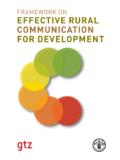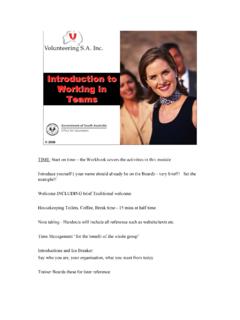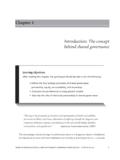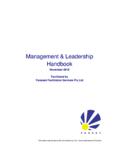Transcription of I-Messages vs. You-Messages - Gordon Training International
1 And/or current parenting models in an article, How Compares to Other Parent Training Programs.. How Compares to Other Parenting Programs Programs Included in this comparison: Parent Effectiveness Training ( ). Nonviolent Communication ( ). How to Talk so Kids Will Listen and Listen so Kids Will Talk Systematic Training for Effective Parenting ( ). Active Parenting Love and Logic Triple P (Positive Parenting Program). Dare to Discipline Parent Effectiveness Training ( ). Author: Dr. Thomas Gordon Philosophy: Democratic Applies to All Relationships: Yes Year of Origin: 1962. Book: Parent Effectiveness Training ( ), 1970, 2000. Course: Parent Effectiveness Training ( ), 1962, 1976, 1989, 2005.
2 Course Length: Eight 3-hour sessions Summary of this Model: This book and course offer a philosophy and set of communication and conflict resolution skills for helping parents develop and maintain a democratic, mutually satisfying relationships with their children and with each other. The conceptual model is the Behavior Window, a framework that Dr. Gordon developed for determining who owns the problem. Parents learn to use this window to help them to decide which skill to use depending on whose problem it is. There is heavy emphasis on learning the communication and conflict resolution skills so they can be used right away, both at home and in all relationships.
3 Main Concepts and Skills of this Model: Three types of parenting styles: Authoritarian, Permissive, Democratic Focus is on teaching the Democratic style No use of parental power; needs of both parent and child important; conflicts solved so both get their needs met Training is needed to learn any new skill Behavior Window provides a framework for dealing with all behaviors Problem Ownership Communication and Conflict Resolution skills to handle any relationship problem Acceptance of child as s/he is Acceptance demonstrated through Active Listening 12 Communication Roadblocks Misbehavior is the language of power Authentic, congruent expression of true feelings without blame Avoidance of labels and judgments Anger and what's beneath it I-Messages vs.
4 You-Messages Shifting gears to deal with resistance to I- message Modifying the physical environment to prevent problems and conflicts Harmful effects of both rewards and punishments, including logical consequences and time-out Disadvantages of both strict and permissive parenting styles Win-lose conflict resolution methods as compared with the No-Lose Method Parents use influence, not control Family rule-setting; Principle of Participation Conflicts resolved so that the needs of both parent and child are important and both are satisfied with the solution; no one loses How to handle values differences through modeling, consulting, I-Messages . Nonviolent Communication ( ).
5 Author: Dr. Marshall Rosenberg Philosophy: Democratic Applies to All Relationships: Yes Year of Origin: 1975. Book: Nonviolent Communication: The Language of Life, 2003. Course: Nonviolent Communication Course Length: 13 2/12hour sessions Summary of this Model: This book and course offers a philosophy for having more meaningful, deeper connections with children, other people and oneself. It focuses on needs one's own and those of the other person and makes a case for learning to communicate in ways that create harmony and peace between people instead of arguments, misunderstandings and even violence. And it demonstrates the attitudes and skills that are needed to have such relationships both in the family and with others.
6 Main Concepts and Skills of this Model: Observing behavior without evaluation Identifying and expressing feelings and needs without judging Taking responsibility for one's feelings Receiving other's communication empathically Reflecting back other's feelings Self-counseling Avoiding self-judgment Expressing anger by connecting it with unmet needs Harmful effects of punishments and rewards Expressing appreciation vs. praise as compared with and are grounded in the same philosophy. They have quite different ways of presenting their models. Both Thomas Gordon and Marshall Rosenberg were students of Carl Rogers. How to Talk so Kids Will Listen and Listen so Kids Will Talk Authors: Elaine Mazlich and Adele Faber Philosophy: Democratic Applies to All Relationships: Yes Year of Origin: 1980.
7 Book: How to Talk so Kids Will Listen and Listen so Kids Will Talk, 1980. Course: How to Talk so Kids Will Listen and Listen so Kids Will Talk Course Length: Six sessions, six 30-minute videos or audios. Summary of this Model: This book and course offer parents empathic listening skills, authentic self-disclosure and problem-solving skills for raising children with high self-esteem and autonomy. It focuses on helping a child view him/herself differently by letting go of old ineffective roles or labels and as a result have freedom to develop and change. Main Concepts and Skills of this Model: Helping children deal with negative feelings Accepting and acknowledging children's feelings Avoiding typical unhelpful ways to get children to cooperate Gaining cooperation by being congruent (describe the problem, express feelings).
8 Instead of punishment, expressing feelings, stating expectations, telling child how to make amends, giving choices, taking action, problem solving Setting boundaries and limits. Encouraging autonomy by helping children function on their own Praising children by describing their behavior, not evaluating it. Avoiding labeling, allowing freedom for children to develop and change as compared with How to Listen so Kids Will Talk .. This model is based on the work of Dr. Haim Ginott (a student of Carl Rogers) and has a philosophy with some similarities to Systematic Training for Effective Parenting ( ). Authors: Dr. Don Dinkmeyer and Dr. Gary McKay Philosophy: Democratic Applies to all Relationships: No Year of Origin: 1976.
9 Book: The Parent's Handbook: Systematic Training for Effective Parenting ( ), 1997. Course: Systematic Training for Effective Parenting ( ). Course Length: Nine 2-hour sessions Summary of this Model: This book and course focus on how children grow and behave, on misbehavior and effective ways to deal with it, on the importance of encouraging children and how to do that effectively, on listening to children with empathy and talking to them authentically. It deals with both Natural and Logical Consequences as alternatives to rewards and punishments in disciplining children. (Natural Consequences are those which occur naturally. Logical Consequences are those created by a parent in response to a child's misbehavior.)
10 It advocates family meetings (to plan for fun, to express feelings, to make decisions, to resolve conflicts). Main Concepts and Skills of this Model: Three types of parents: Authoritarian, Permissive, Democratic Focus is on teaching the Democratic style Democratic style helps children become responsible by setting limits and giving choices within those limits Why children misbehave How to deal with misbehavior Setting limits Giving encouragement instead of praise Reflective listening Messages Problem Ownership Problem-Solving Family Meetings Giving choices Disadvantages of punishment Applying Logical Consequences as a way to discipline Logical Consequences different than Punishment as compared with 's focus is on why children misbehave and how parents can deal with misbehavior effectively.






